Методические рекомендации для студентов ii курса по теме Медицинское обcлуживание в Великобритании
 Скачать 1.33 Mb. Скачать 1.33 Mb.
|
|
Прочтите и переведите следующие бессоюзные придаточные предложения 1.We know the greatest hazard to man is found in the water contaminated with the discharges from the human body. 2. Civilization requires the wastes of the human body should be removed from habitation safely and promptly. 3. Were the water not disinfected with chlorine, the pathogenic and other forms of bacteria would not be destroyed. 4. Had they not purified the drinking water in this area, the disease would have been immediately transmitted. Определите виды придаточных предложений и переведите их: 1.We know well Servet was the first anatomist to describe the pulmonary circulation in the first half of the 16th century (1536-1538). 2. The phenomenon of the transfer of carbon dioxide from the blood into the lungs Sechenov investigated is due to the law of diffusion of gas from the fluid into the air. 3. The vital capacity of the lungs many physiologists have studied changes in some cardiac and pulmonary diseases. 4. The great English anatomist W. Harvey found out that the heart changed its colour during the contractions. Nominative with the Infinitive construction Revise “Nominative with the Infinitive construction”. Choose the correct answer: He is said to … a new poem. To write; Be writing. We are likely … problems with our visas. To have; To be having. The criminals must … to the South to cross the boarder and disappear. Go; Be going. She is supposed … next Tuesday. to return; to bereturning; He doesn't say, but he seems … you. To love; To be loving. The businessman is believed … $1000000 a week. To earn; To have earned. This student is unlikely … all the exams this term. To pass; To be passing. I happened … at the hotel where I met my old friend. To stay; To be staying. You must … everything you have heard here. Forget; Be forgetting. You can’t … really so! Think; Be thinking. III. Topic discussion Phrases given below are taken from doctor-patient conversation Write down the conversation. Put the phrases in the right order; Read your dialogue. Dr. Young: Good morning, Mr. Hollister./Are you still taking your digitalis?/I believe you have hardening of arteries(облитерацияартерий) with heart involvement (поражениесердца)./How are you getting along?/ Now your heart is not able to perform the work it is supposed to./regarding your treatment, I think you should continue to take one tablet of digitalis daily and stay on a salt free diet./ You need to do this indefinitely, otherwise (иначе) you’ll get into trouble./ What seems to be the problem?/ Three weeks from today. Good-bye now and be careful./Do you put any salt in your food? Mr. Hollister: I have not been feeling well for the last week./ Well, Doctor, I have been not taking digitalis for the last week./Doctor, could you tell me what my problem is?/When shall I come back?/I have had some shortness of breath, and as you can see, my legs are swollen now./Bye. See you in three weeks then./I find it hard to eat completely without salt./ Read the conversation between the doctor and the patient again. Find statements corresponding to the talk. а)Больной жаловался на одышку и отёчность ног. б)У больного не было жало на одышку. 2. а)Больной принимал по одной таблетке дигиталиса в течение недели. б)Больной не принимал дигиталис в течение недели. 3. а)Больной чувствовал себя хорошо. б)У больного была сердечная недостаточность. 4. а)Врач посоветовал больному придерживаться бессолевой диеты. б)Больной придерживался бессолевой диеты. Make up a conversation between a doctor and a patient. Use words and word combinations given below. Where does it hurt? Can you describe the pain? What makes it worse? Complaints, to complain of, to have troubles with the heart, to have pain in the heart, the character of the pain, dull pain, sharp pain, to have pain on physical exertion, arterial pressure, angina pectoris, cardiac failure. Read the dialogue Dialogue Dr. Harper: Have you ever been sick before? Patient James Ross: Yes, sir. I have had scarlet fever and pneumonia. Dr. Harper: Have you ever had measles? Chicken pox?Whooping cough? Patient James Ross: Yes, sir. I had all the childhood diseases. Dr. Harper: How about adult illnesses, have you ever had TB, jaundice, heart or kidney trouble? Patient James Ross: No, I have only had the ones I just told you. Dr. Harper: Have you ever been operated on? Have you ever had any operations? Patient James Ross: Yes, several. I’ve had my appendix out. And I’ve also had my tonsils operated on. Dr. Harper: Did you ever break any bones? Patient James Ross: I broke my arm when I was a child and that’s all. Dr. Harper: Are your parents living? Patient James Ross: No, both are no longer living. My father died of natural causes and my mother died of cardiac insufficiency. Dr. Harper: Do you have brothers and sisters? Are they in good health? Patient James Ross: I have two brothers, one is living and the other is not. He had a stroke. My sister has diabetes. Dr. Harper: Are you married? Do you have any children? Patient James Ross: Oh, yes. I’m married. I have two boys and they seem to be all right. Dr. Harper: Do you smoke? Patient James Ross: I smoke 10 cigarettes a day. I tried to quit twice, but with no success. Read the dialogue again and make up recommendations for students to take a past history and a family history. Use the following phrases: To take a past history and a family history, you should…,You will also need the information about…,Remember to ask you patient …,It is important to know… . Read the text Say what organs and functions the doctor examines; Give all stages of a physical examination. Word combinations to be used: First it is necessary to…; The next step is to…; The physical examination also includes…; It is important to…, Finally, … . During the Physical Examination Dr. Hudson came closer to the patient. He noted the patient’s general appearance and checked the skin and mucous membranes carefully. With an ophthalmoscope he examined the eyegrounds; and with the otoscope- the tympanic membranes. He checked the patient’s neck and chest. Dr. Hudson asked the patient to take a deep breath and hold it. Then to blow the air out and hold it.Then not to breathe at all. Then he wanted the patient to breathe in and out through his mouth and to say – “ninety-nine, ninety –nine”… Dr. Hudson asked the patient to lie down on the examining table and palpated the abdomen. The patient had no pain in the abdomen. After checking the patient’s back and extremities, he took the reflex hammer and checked the reflexes. He then checked the patient’s blood pressure. It was 120 over 70. That was normal. The doctor’s plan was to have some laboratory tests done the next day including blood and urine tests, and an X-ray of the stomach. He invited the patient to come to discuss the diagnosis and treatment after he would have received the tests results. You take part in a conference “Health Service in Great Britain”. Make a report on the following topics: The character of health service in Great Britain. The types of patients receiving medical treatment and care in Great Britain. The role of the family doctor (in the National Health Service). Private hospitals in Great Britain. Health centres in Great Britain. Ask questions to each other. 1. Primary reading of the text 2. Introduction of key words: 3. Discussing the contents of the text. 6. Annotation of the text. Home work:Make up a presentation “Health care system in Great Britain”, Appendix: Work on the questions to the credit. ЛИТЕРАТУРА: 1. - Марковина И.Ю., и др. Английский язык: учебник для медицинских вузов/ под ред. И.Ю.Марковиной: 3-е изд., испр. - М.: ГЭОТАР-МЕДИЯ, 2009. 2. Маслова А.М., Вайнштейн З.И., Плебейская Л.С. Учебник английского языка для медицинских вузов: 4-е изд., испр.- М.: Лист Нью, 2006. 3. Сосаре М.П. Английский язык для врачей: 2-е изд., испр.- Рига: ZVAIGZNE, 1978. 4. http://njnj.ru/vuz/question_types.htm 5. http://english-info.ucoz.ru/index/0-114 6. http://www.study.ru/lessons/upperint1-4-ex.html Appendix GRAMMAR: СЛОЖНОЕДОПОЛНЕНИЕ (COMPLEXOBJECT) Сложное дополнение представляет собой сочетание имени существительного в общем падеже или местоимения в объектном падеже и инфинитивом глагола. Iknowthedoctor (him) tocomeat 9.Я знаю, что доктор (он) придёт в 9 часов. Сложное дополнение равнозначно придаточному предложению и поэтому состоит из двух компонентов:1) имени существительного (или местоимения), обозначающего лицо (или предмет), которое совершает действие (соответствует подлежащему придаточного предложения), и 2) инфинитива, выражающего действие, совершаемое лицом или предметом (соответствует сказуемому придаточного предложения). Сложное дополнение переводится на русский язык придаточным дополнительным предложением, вводимым союзами что, чтобы, как. I expect him to be there. Я думаю, что он там. I want you to go without me. Я хочу, чтобы вы поехали без меня. Сложное дополнение употребляется после глаголов, выражающих: Желание или потребность: towantхотеть, требовать, нуждаться; towishжелать; Предположение, мнение, суждение: tosupposeпредполагать, полагать;toexpectожидать, думать; toconsider, tobelieveсчитать, полагать; tothinkдумать, считать; Физическое восприятие или ощущение: toseeвидеть; tohearслышать; tofellощущать, чувствовать;towatch, toobserveнаблюдать; tonoticeзамечать. После этих глаголов инфинитив употребляется без частицыto. I saw her leave the operating room. Я видел, как она вышла из операционной. Знание, осведомлённость, утверждение, констатацию: toknowзнать; tonoteотмечать; tofindнаходить; toclaimутверждать; tostateконстатировать. We find cancer to be an extremely severe disease. Мы находим, что рак - тяжелейшее заболевание. Принуждение, разрешение или запрет: tomakeзаставлять; toforceвынуждать; toallow, topermitпозволять; toorder, tocommandприказывать; toletпозволять; toenableдавать возможность, позволять; Сложное дополнение после этих глаголов не переводится развёрнутым придаточным предложением. После глаголов tomakeиtolet инфинитив употребляется без частицыto. They made uswork all night. Они заставили нас работать всю ночь. Презентация на тему ComplexObject: СЛАЙД 1. 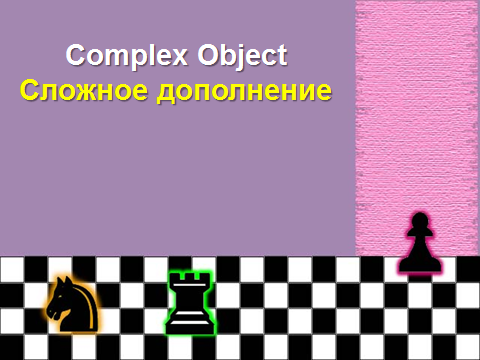 СЛАЙД 2. 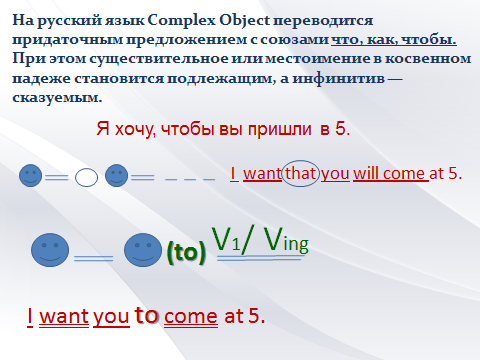 СЛАЙД 3. 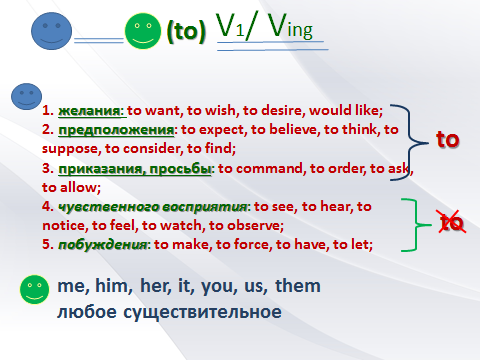 СЛАЙД 4. 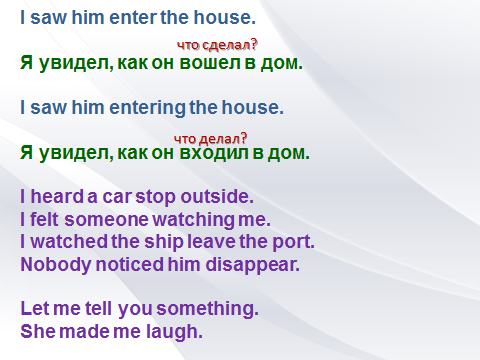 СЛАЙД 5. 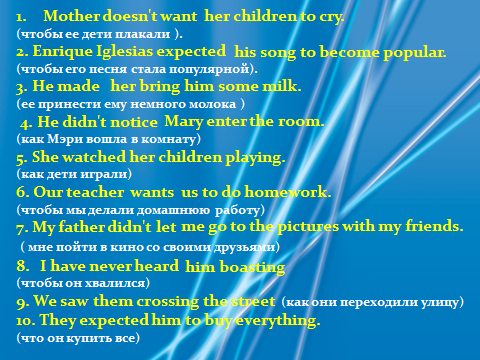 СЛАЙД 6. 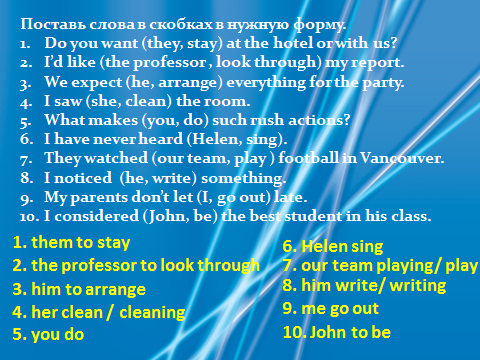 СЛАЙД 7. 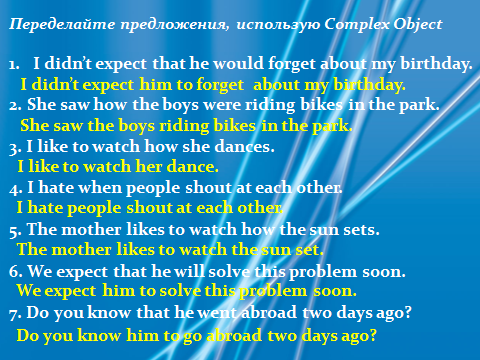 СЛАЙД 8. 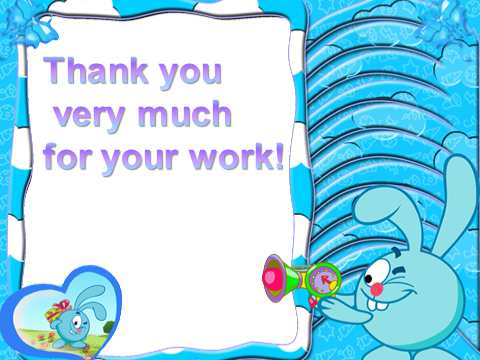 Полезные ссылки на презентации по теме “ComplexObject”: http://www.myshared.ru/slide/66174/ (см. также в электронном приложении) http://ppt4web.ru/anglijjskijj-jazyk/comple-obect-v-anglijjskom-jazyke.html БЕССОЮЗНЫЕ ПРИДАТОЧНЫЕ ПРЕДЛОЖЕНИЯ Придаточные дополнительные Союзthatчто, присоединяющий придаточные дополнительные предложения к главному, часто опускается. I know that Doctor N. Is in the laboratory.= IknowDoctorN. isinthelaboratory.Я знаю, что врач Н. находится в лаборатории. Придаточные определительные В придаточных определительных предложениях союзное слово (местоимения that,which) может быть опущено, если оно не является подлежащим придаточного определительного предложения. При бессоюзном подчинении придаточных определительных предложений могут оказаться рядом два подлежащих (обычно два существительных или существительное и личное местоимение), а за ними два сказуемых от разных предложений. При переводе таких предложений на русский язык следует восстанавливать пропущенное союзное слово. The experiment (which ) this student is making gives good results. Эксперимент, которыйпроводитэтотстудент, даётположительныйрезультат. The girl (whom) the doctor is examining is from our group. Девушка, которую осматривает врач, из нашей группы. Условные придаточные В условных придаточных предложениях второго и третьего типа союзы могут быть опущены. В присоединённом без союза придаточном предложении условия вспомогательные глаголы выносятся на место перед подлежащим. If she had taken the drug regularly, she would have felt better= Had she taken the drug regularly, she would have felt better.Еслибыонапринималалекарстварегулярно, оначувствовалабысебялучше. If he were here, he would speak.=Were he here, he would speak. Если бы он был здесь, он бы выступил. ОБОРОТ «ИМЕНИТЕЛЬНЫЙ ПАДЕЖ С ИНФИНИТИВОМ» (NOMINATIVEWITHTHEINFINITIVE) Сложно-подчиненное предложение с главным предложением, выраженным безличным оборотом типа itissaid говорят, itisreported сообщают, itseems кажется, itislikely вероятно, можно заменить простым предложением: Сложно-подчиненноепредложение: It is said that they know Chinese very well. Простоепредложение: They are said to know Chinese very well. Говорят, что они очень хорошо знают китайский язык. При замене такого сложноподчиненного предложения простым местоимение it опускается, подлежащее придаточного предложения (they) ставится вместо местоимения it перед сказуемым главного предложения, которое согласуется с этим новым подлежащим в лице и числе, союз that также опускается, а сказуемое придаточного предложения (know) принимает форму инфинитива (toknow). В простом предложении TheyaresaidtoknowChineseverywell подлежащим к сказуемому aresaid является не одно местоимение they, а сочетание местоимения they с инфинитивом toknow. Такое сложное подлежащее (they ... toknow) представляет собой оборот «именительный падеж с инфинитивом» (NominativewiththeInfinitive). Инфинитив в обороте «именительный падеж с инфинитивом» употребляется во всех формах: 1.SimpleInfinitive (как Active, так и Passive) выражает действие, одновременное с действием, выраженным глаголом в личной форме: Не is said to live in Piter. Говорят, что он живет в Питере. He was said to know several oriental languages. Говорили, что он знает несколько восточных языков. 2. ContinuousInfinitive выражает длительное действие, одновременное с действием, выраженным глаголом в личной форме: The water seems to be boiling. Вода, кажется, кипит. He was said to be writing a new play.Говорили, чтоонпишетновуюпьесу 3. Perfect Infinitive (как Active, так и Passive) выражаетдействие, предшествующеедействию, выраженномуглаголом в личнойформе: Не is said to have lived in Minsk. Говорят, что он жил в Минске. Не is said to have been appointed director of a big plant. Говорят, что его назначили директором большого завода. 4. PerfectContinuousInfinitive выражает длительное действие, совершавшееся в течение известного периода времени, предшествовавшего действию, выраженному глаголом в личной форме. При этом PerfectContinuousInfinitive может выражать как действие, еще происходящее в момент совершения действия, выраженного глаголом в личной форме, так и действие, уже закончившееся до этого момента: The goods are reported to have been awaiting shipment for several days. Сообщают, что товары ожидают от грузки в течение нескольких дней. Примечание. Следует иметь в виду, что SimpleInfinitive выражает одновременное, aPerfectInfinitive предшествующее действие по отношению к действию, выраженному глаголом в личной форме, независимо от времени, в котором стоит глагол в личной форме: Не is known to work hard. Известно, что он работает усердно. Не was known to work hard. Было известно, что он работает усердно. They are reported to have arrived in Moscow. Сообщают, что они приехали в Москву. Случаи употребления оборота «именительный падеж с инфинитивом»
ADDITIONAL TEXTS: Text1. |
